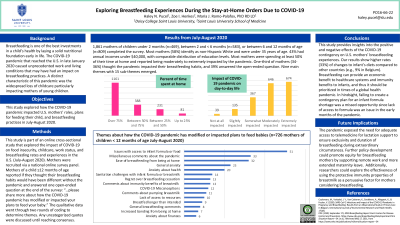Back

Objectives: This study explored how the COVID-19 pandemic may have impacted mothers’ roles, plans for feeding their child, and breastfeeding practices in the United States.
Methods: This study is part of an online cross-sectional study that explored the impact of COVID-19 on food insecurity, childcare, work status, breastfeeding rates, and experiences in the U.S. (July-August 2020). Subjects were recruited via a national online survey panel. Mothers of a child ≤12 months of age reported if they thought their breastfeeding habits would have been different without the pandemic and answered one open-ended question at the end of the survey: “…please share more about how the COVID-19 pandemic has modified or impacted your plans to feed your baby.” The data went through two rounds of coding to determine themes, and any uncategorized quotes were discussed until reaching consensus.
Results: 1,861 mothers of children under two months (n=469), between 2 and < 6 months (n=583), or between 6 and 12 months of age (n=809) completed the survey. One-third of mothers (34-36%) thought the pandemic impacted their breastfeeding habits, and 39% answered the open-ended question. Nine main themes with 15 sub-themes emerged. Major themes arose, including the immunity benefits of breastfeeding, ease of breastfeeding from home, regret of breastfeeding cessation, limited access to resources and formula, and anxiety over finances and health. The stay-at-home orders provided some mothers with positive breastfeeding experiences, while others faced barriers due to the COVID-19 pandemic, including lack of breastfeeding support and hygienic challenges. Some mothers found that the time at home facilitated a bond between them and their baby, resulting in some mothers breastfeeding longer than planned. Many mothers reported the COVID-19 pandemic to be stressful for them, and in some cases, mothers reported low milk supply due to stress.
Conclusions: Breastfeeding is an invaluable resource that provides many benefits thus it should be prioritized, especially in times of a global health pandemic. The pandemic exposed the need for universal maternity leave or flexible working from home conditions for breastfeeding mothers and access to lactation specialists via telehealth.
Funding Sources: Saint Louis University Rapid Response COVID-19 Seed Fund
Maternal, Perinatal and Pediatric Nutrition
(PO16-66-22) Exploring Breastfeeding Experiences During the Stay-at-Home Orders Due to COVID-19


Haley N. Pucel, BS
– Dietetic Intern, Saint Louis University, Plainfield, Illinois, United States- ZH
Zoe I. Henkes
– Saint Louis University - MR
Maria J. Romo-Palafox, PhD RD LD
– Saint Louis University
Presenting Author(s)
Co-Author(s)
Disclosure(s):
Haley N. Pucel, BS: No relevant financial relationship(s) with ineligible companies to disclose.
Objectives: This study explored how the COVID-19 pandemic may have impacted mothers’ roles, plans for feeding their child, and breastfeeding practices in the United States.
Methods: This study is part of an online cross-sectional study that explored the impact of COVID-19 on food insecurity, childcare, work status, breastfeeding rates, and experiences in the U.S. (July-August 2020). Subjects were recruited via a national online survey panel. Mothers of a child ≤12 months of age reported if they thought their breastfeeding habits would have been different without the pandemic and answered one open-ended question at the end of the survey: “…please share more about how the COVID-19 pandemic has modified or impacted your plans to feed your baby.” The data went through two rounds of coding to determine themes, and any uncategorized quotes were discussed until reaching consensus.
Results: 1,861 mothers of children under two months (n=469), between 2 and < 6 months (n=583), or between 6 and 12 months of age (n=809) completed the survey. One-third of mothers (34-36%) thought the pandemic impacted their breastfeeding habits, and 39% answered the open-ended question. Nine main themes with 15 sub-themes emerged. Major themes arose, including the immunity benefits of breastfeeding, ease of breastfeeding from home, regret of breastfeeding cessation, limited access to resources and formula, and anxiety over finances and health. The stay-at-home orders provided some mothers with positive breastfeeding experiences, while others faced barriers due to the COVID-19 pandemic, including lack of breastfeeding support and hygienic challenges. Some mothers found that the time at home facilitated a bond between them and their baby, resulting in some mothers breastfeeding longer than planned. Many mothers reported the COVID-19 pandemic to be stressful for them, and in some cases, mothers reported low milk supply due to stress.
Conclusions: Breastfeeding is an invaluable resource that provides many benefits thus it should be prioritized, especially in times of a global health pandemic. The pandemic exposed the need for universal maternity leave or flexible working from home conditions for breastfeeding mothers and access to lactation specialists via telehealth.
Funding Sources: Saint Louis University Rapid Response COVID-19 Seed Fund

.png)
